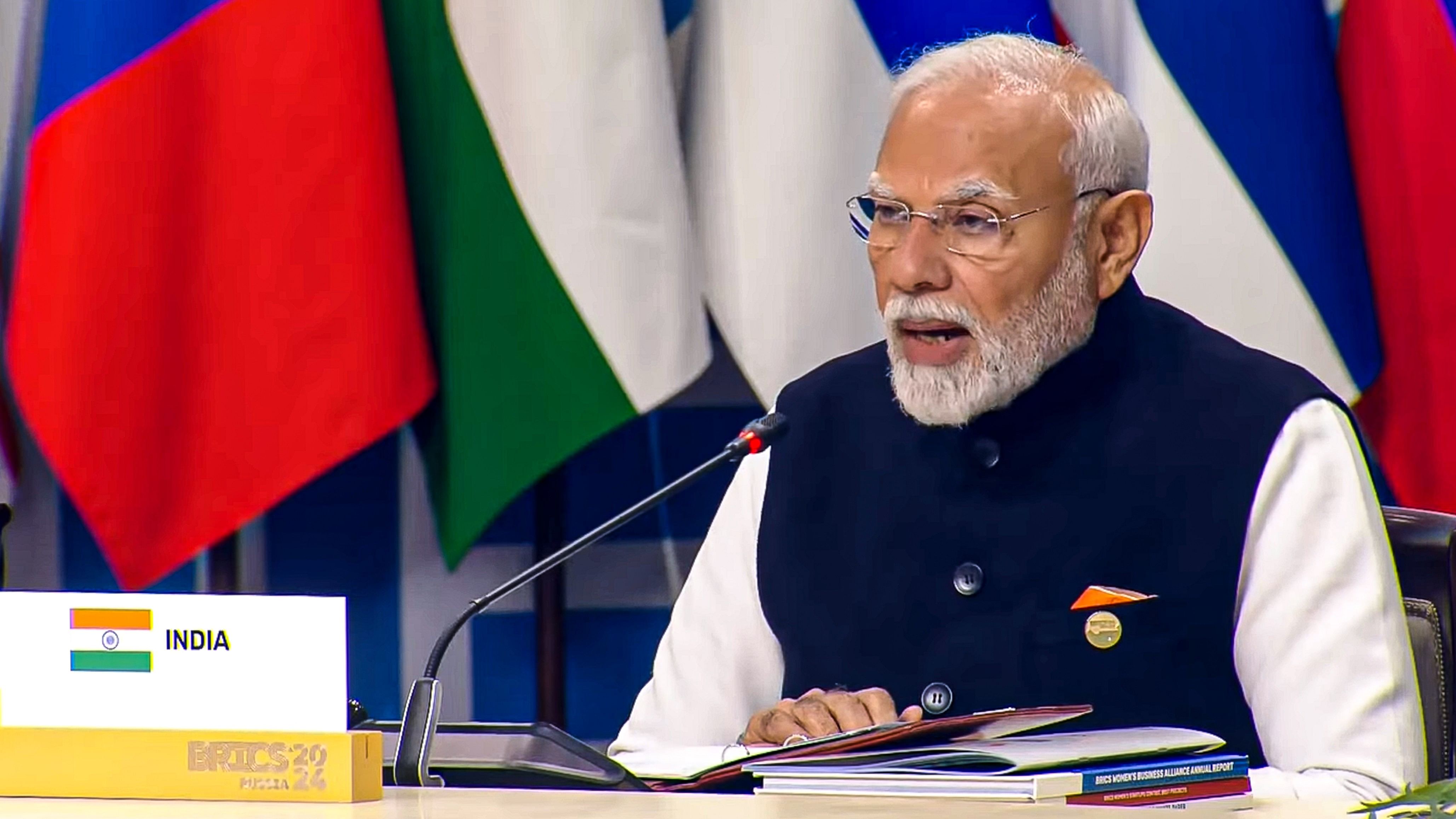
Prime Minister Narendra Modi speaks during BRICS Leaders' Summit, in Kazan, Russia, Wednesday.
Credit: PTI Photo
New Delhi: There is no scope for double standards on the issue of combatting terrorism, Prime Minister Narendra Modi said at the BRICS summit at Kazan in Russia on Wednesday.
The Prime Minister’s comment at the 16th BRICS summit appeared to be a subtle dig not only at fellow BRICS member China, which often shields terrorists based in Pakistan from United Nations sanctions, but also at Canada and the United States for not acting against extremists running a secessionist campaign to carve out a Khalistan from India for the Sikhs.
"We must work together on the long pending matter of Comprehensive Convention on International Terrorism in the UN," said Modi, adding, "In the same way, we need to work on global regulations for cyber security and for safe and secure Artificial Intelligence".
Modi said that the BRICS, which of late expanded its membership from five to nine, should unitedly raise its voice for reforms of global institutions, by citing its own example of willingly evolving as an organisation with time. "We must move forward in a time bound manner on reforms in global institutions such as the UN Security Council, Multilateral development banks, and the World Trade Organisation," he said, but cautioned, "As we take our efforts forward in BRICS, we must be careful to ensure that this organisation does not acquire the image of one that is trying to replace global institutions, instead of being perceived as one that wishes to reform them."
"We support dialogue and diplomacy, not war,” Modi said, reiterating what he had been repeatedly conveying to Russian President Vladimir Putin, the host of the summit, ever since the former Soviet Union nation launched “a special military operations” in Ukraine in February 2022.
India articulated its position in favour of resolving all issues through dialogue and diplomacy, and not through war, even in the context of West Asia, where Israel’s offensive against Hamas in Gaza and Hezbollah in Lebanon might escalate to a wider regional conflict.
"In order to counter terrorism and terror financing, we need a single-minded and firm support from all. There is no place for double standards on this serious matter,” Modi said at the closed plenary of the BRICS summit on Wednesday. Chinese President Xi Jinping was among the other BRICS leaders who attended the summit. "We need to take active steps to stop radicalization of youth in our countries," added the Prime Minister.
Beijing last year blocked a proposal moved by New Delhi and Washington DC to get the United Nations Security Council (UNSC) designate Sajid Mir as a terrorist and impose sanctions on him.
China, one of the five permanent members of the Security Council, had in September 2022 placed a “technical hold” on the proposal to designate him as an individual linked to Al Qaeda, Taliban and Islamic State in Iraq and Levant (ISIL) and to put him under full-spectrum UN sanctions, including assets freeze, travel ban and arms embargo.
China had in the past blocked several proposals moved by India and other nations at the council to impose sanctions on terrorists based in Pakistan. It had used "technical holds" for years to block New Delhi’s repeated moves to get the UNSC to impose sanctions on Masood Azhar, the leader of the Jaish-e-Mohammed based in Pakistan and the mastermind of several terrorist attacks in India, including the one on paramilitary personnel in Pulwama in Jammu and Kashmir on February 14, 2019.
China, in May 2019, finally allowed the Security Council to move against the radical cleric based in Pakistan. It had similarly blocked India’s moves at the Security Council to impose UN sanctions on the terrorist organization Lashkar-e-Tayyiba’s deputy chief Abdul Rehman Makki, its 'commander' Zaki Ur Rehman Lakhvi and the Hizbul Mujahideen chief Syed Salahuddin – all based in Pakistan.
